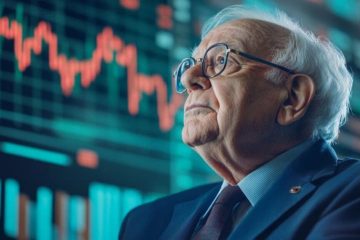Berkshire shareholders expect a new era after Buffett

Berkshire investors brace for a transformative phase as Buffett prepares to pass the leadership torch. Berkshire Hathaway shareholders, reflecting on the exit of iconic investor Warren Buffett, expect that the conglomerate he developed over six decades will maintain its enduring focus and culture. However, there are concerns regarding the potential impact of losing Buffett’s unique vision and influential presence. In light of Buffett’s unexpected declaration on Saturday regarding his impending resignation as chief executive by year-end, shareholders and admirers of Berkshire have expressed confidence that the Omaha, Nebraska-based firm will continue to thrive under the leadership of Vice Chairman Greg Abel, who is set to assume the role.
However, it remains uncertain how the $1.16 trillion conglomerate, which encompasses 189 operating businesses, $264 billion in stocks, and $348 billion in cash, will perform following the departure of the individual so closely associated with it. Buffett announced this at the conclusion of the Berkshire annual meeting, following an extensive session addressing shareholder inquiries. Berkshire’s board of directors is scheduled to convene on Sunday to deliberate on the transition. “There has been a premium on Berkshire because of Buffett,” stated Mark Malek, chief investment officer at Siebert.NXT.
“Will individuals perceive it in a similar manner?” Richard Casterline, a computer programmer from Denver, expressed that it was “a bit shocking” to learn of Buffett’s departure. “I am interested to observe the movement of the stock price on Monday,” he stated. “I do not believe that (Abel) generates the same level of enthusiasm.” It is not a matter of personal failing; rather, it prompts contemplation of who might attain a level of legendary status comparable to that of the two in question. It is indeed a challenging role to assume.
Nonetheless, a considerable number of observers regard Abel as well-suited for the position. “This is Buffett’s baby, and he thoughtfully and deliberately planned for an orderly succession that does not disrupt the value of his life’s work,” stated Daniel Hanson, senior portfolio manager at Neuberger Berman. “I possess complete confidence in Greg’s leadership.” Richard Lancaster, an accounting consultant from Charlotte, North Carolina, compared the transition to Steve Jobs entrusting Apple’s leadership to current Chief Executive Tim Cook in 2011. “You possess two distinct personalities, each embodying a unique approach,” remarked Lancaster. “Greg possesses all the attributes that Warren values in a manager: a highly astute individual, well-informed about the current business environment and the impending transformations driven by disruptive technologies.”
Under Buffett’s leadership, Berkshire’s annualized shareholder return has approximately doubled that of the Standard & Poor’s 500. The influence of Buffett was significant; whenever Berkshire announced new common stock investments, it consistently resulted in an uptick in stock prices, regardless of whether Buffett was directly involved in the investing process. Some analysts suggest that Abel could take a more active role than Buffett in managing Berkshire’s subsidiaries. “Abel’s going to have to tread a fine line between maintaining a Buffett-like environment, while also making his mark,” stated analyst Cathy Seifert at CFRA Research.
Some investors are advocating for Berkshire to distribute a dividend, a practice it has abstained from since 1967. Before Buffett’s announcement, which Abel was unaware of, the vice chairman informed annual meeting attendees that he would be “more active, but hopefully in a very positive way,” in overseeing Berkshire subsidiaries, while they would still operate “very autonomously.” Berkshire’s portfolio encompasses a wide array of enterprises, featuring Geico car insurance, the BNSF railroad, various utility and power companies, a real estate brokerage, and retail brands including Dairy Queen, Fruit of the Loom, and See’s Candies.
Another potential adjustment: the extent to which Berkshire will divest its owned businesses, particularly in instances of underperformance. Buffett is recognized for his acquisition of businesses; however, he has made exceptions in cases where these businesses have diminished their competitive advantages. In 2019, Berkshire divested its Applied Underwriters workers compensation unit, and the following year, it relinquished its newspaper empire as declining advertising revenue prompted Buffett to characterize the industry as “toast.” Since 2018, the leaders of the majority of Berkshire businesses have been reporting to Abel, whereas the insurance divisions, including Geico, General Re, and National Indemnity, have been reporting to Vice Chairman Ajit Jain, a practice that will persist.
Managers commend Abel for his ability to rapidly assimilate knowledge, even while managing a diverse portfolio that includes Precision Castparts, an aircraft parts manufacturer, Israeli toolmaker Iscar, and Borsheims jewelry. Rapid adjustments are improbable. The substantial scale of Berkshire renders the reversal of Buffett’s efforts or the execution of a transformative acquisition quite challenging. “Buffett has built such an amazing machine,” remarked Nate Garrison, chief investment officer at World Investment Advisors. “It is a concept that will endure through the ages.”
Shareholders asserted that Buffett’s legacy will endure. Sameer Naik, a software architect from Omaha, remarked that Buffett imparted the lesson of patience to investors in their investment endeavors. “His most significant legacy is instilling in investors a considerable degree of confidence that they can accumulate wealth, albeit at a more gradual pace,” Naik stated. “Investing in companies that you comprehend, while maintaining a long-term perspective, is likely to yield favorable outcomes.”
Pamela Taylor, a resident of Chicago engaged in technology sales, indicated that she has extensively examined Buffett’s investment approach over an extended period. “His strategy of buy-and-hold, in particular, can be very different from the quick-sell technique that other investors employ,” she stated. “That will be his legacy.” Many shareholders anticipate a reduction in Berkshire’s annual shareholder weekend, which attracts tens of thousands to Omaha for shopping and various events, including the annual meeting. “It presents a chance to engage with individuals who share a similar ethical framework,” stated Robert O’Connor, a family physician from Victoria, British Columbia. “It represents our Coachella.”








